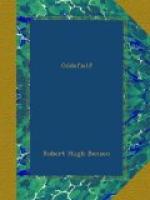“Have you not heard?” he cried. “Why the Popish dogs were hanged a week ago—Ireland and Grove, I mean. And there be three or four more men—accused by Bedloe of Godfrey’s murder, and will be tried presently.”
I need not say what a horror it was to me to hear that; for I had had more hope in my heart than I had thought. But I was collected enough to say something that satisfied him; and, as again he had been drinking, he was not very quick.
“And those three or four?” I asked. “Are they Jesuits too?”
“No,” said Rumbald, “but there will be another batch presently, I make no doubt.”
I got rid of him at last; and rode homewards; but it was with a very heavy heart. Not once yet had the King exercised his prerogative of mercy; and if he yielded at the first, and that against the Jesuits whom he had sworn to protect, was there anything in which he would resist?
My Cousin Dorothy saw in my face as I came in that something was the matter; so I told her the truth.
“May they rest in peace,” she said; and blessed herself.
* * * * *
From time to time news reached us in this kind of manner. Though we were not a great distance from London we were in a very solitary place, away from the high-road that ran to Cambridge; and few came our way. Even in Puckeridge it was not known, I think, who I was, nor that I was cousin to Mr. Jermyn; so I had no fear of Mr. Rumbald suspecting me. Green, Berry, and Hill were all convicted of Sir Edmund’s murder, through the testimony of Bedloe, who said that he had himself seen the body at Somerset House, and that Sir Edmund had been strangled there by priests and others and conveyed later to the ditch in Primrose Hill where he was found. Another fellow, too, named Miles Prance, a silversmith in Princes Street (out of Drury Lane), who was said by Bedloe to have been privy to the murder, in the fear of his life, and after inhuman treatment in prison, did corroborate the story and add to it, under promise of pardon, which he got. Green, Berry, and Hill, then, were hanged on the tenth day of February, on the testimonies of these two; and were as innocent as unborn babes. It was remarked how strangely their names went with the name of the murdered man and of the place he was found in.
For a while after that, matters were more quiet. A man named Samuel Atkins was tried presently, but was acquitted; and then a Nathaniel Reading was tried for suppressing evidence, and was punished for it. But our minds, rather, were fixed upon the approaching trial of the “Five Jesuits” as they were called, who still awaited it in prison—Whitbread, Fenwick, Harcourt, Gavan and Turner—all priests. But I had not a great deal of hope for these, when I thought of what had happened to the rest; and, indeed, at the end of May, Mr. Pickering himself was executed. At the beginning of May too, we heard of the bloody murder of Dr. Sharpe, the Protestant Archbishop in Scotland, by the old Covenanters, driven mad by the persecution this man had put them to; but this did not greatly affect our fortunes either way. One of the most bitter thoughts of all was that a secular priest named Serjeant, who, with another named Morris, was of Gallican views, had given evidence in public court against the Jesuits’ casuistry.




